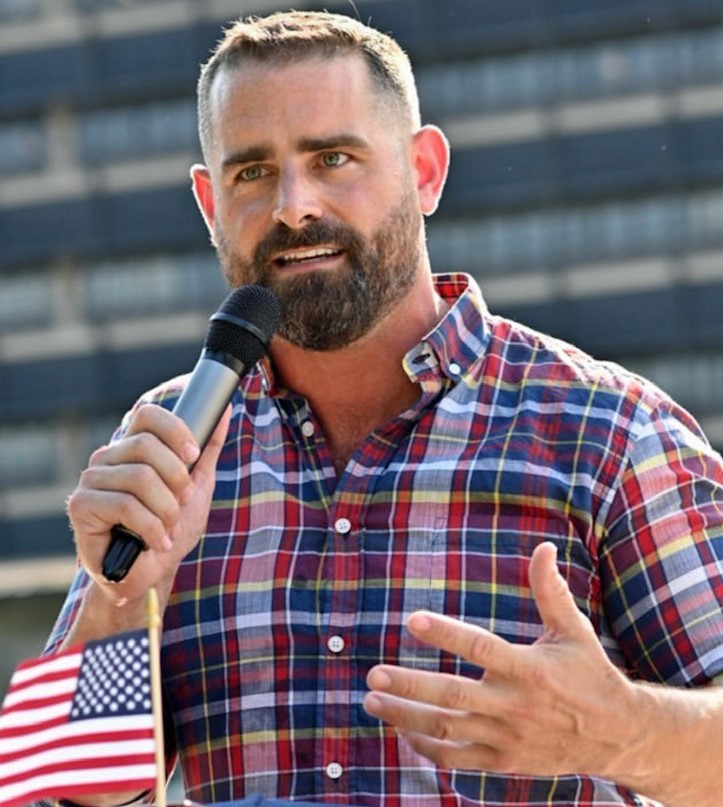Few people have devoted as much of their lives to doing good as Brian Sims. After many years as an attorney, Sims became the first openly LGBTQ+ person elected to the Pennsylvania General Assembly in 2012. During his decade as a legislator, he worked to remove homosexuality from the state criminal code, voted to expand protections for victims of sexual and gender-based violence, defended access to reproductive healthcare, fought for criminal justice reform, and sought solutions to environmental issues disproportionately affecting vulnerable communities.
In 2012, Sims chose to attempt to climb the political ladder by running for Lieutenant Governor, but ultimately lost the state’s Democratic primary to Austin Davis. After that defeat, Sims chose a new direction for his life and joined Out Leadership as its Managing Director of Public Policy & Government Affairs.
Connecticut Voice recently spoke to Sims, who turned 44 last year, about his career, past and present, and what can be done to preserve LGBTQ+ rights:
CV: Why have you always been attracted to public service?
BS: My parents are both retired Army Lieutenant Colonels—they met during Vietnam and stayed active—and through them, I saw the importance of public service. I also saw the true meaning of equality early on in my life because what they did was not defined by gender. In fact, my parents’ entire approach to life was shaped by the notion of equality.
CV: Were you prepared for what it meant to be an openly gay elected official?
BS: I had to learn how to handle the depth and breadth of vitriol within the Assembly that I would receive, not just for my personal life but for standing up for LGBTQ men and women. I was the first out assemblyperson—although I know there are dozens of closeted officials in government, and I understand many of them chose to stay in the closet to either advance their careers or out of fear. I understand that. I wore a bullet-proof vest to and from my car every day. I had to move every two years, because by law, my address became public every 24 months, so I would get death threats. It was very hard on my friends and family because I also put them at risk. I am so grateful nothing happened.
CV: So, how did you become involved with Out Leadership?
BS: I have known about the work of Out Leadership for my whole career. The organization works directly with some of the most powerful businesses in world, from Walmart to Coca-Cola, which are among the most powerful players and influential entities in their states. We discuss issues such as taxes and supply chains, and, more importantly, what they can do to advocate equality.
CV: What does that mean in practical terms?
BS: I will be working with these companies advising them on how to become advocates for LGBTQ rights. There are states and countries where having HIV is a crime; some states still don’t have anti-discrimination laws. We want to pressure these places to change their policies. When Brunei came out against LGBTQ people, by making homosexuality punishable by death, the organization worked with banks around the world to make this unacceptable. It’s my job—our job—to help give businesses a voice.
CV: Is this job just a respite from politics?
BS: My approach to equality work is long-term, and it always has been. I don’t see myself running for office in the near-term, but I didn’t see doing it the first time. Right now, my passion will be helping other LGBTQ people run for office. There should be dozens of us in elected positions.
CV: Do we need more LGBTQ politicians to protect things like gay marriage?
BS: We know all LGTBQ rights are in the crosshairs of this activist Supreme Court. Luckily, the reality is that our officials at the federal level recently enshrined a law—the Respect for Marriage act—that reaffirms the public belief in marriage equality. Plus. the precedent of decisions like Obergfell makes it less likely the Supreme Court could overturn this one right. But we have to be out there to tell our stories. I always say that our personal storytelling has gained us more rights than any politician ever has!
CV: Connecticut is fairly progressive in LGBTQ+ policies. Any thoughts for our state?
Connecticut stands out as one of the states in America where the legal and social environments best support LGBTQ+ people living openly. The Constitution State currently ranks second in the nation on the Out Leadership Business Climate Index but there continues to be a stronger than expected religious exemption for discrimination enshrined in the State’s Religious Freedom Restoration Act. No person in Connecticut should be discriminated against and we urge Connecticut’s leaders to remove these exceptions and fully support equality and non-discrimination.
According to the organization, among nearly 100 member companies, Out Leadership is proud to have many with a valued presence in Connecticut, including BlackRock, iHeartMedia, PwC, Coca-Cola, First Republic Bank, and more! If you’re interested in learning more about how your company can be a part of Out Leadership and using the power of business to advance LGBTQ+ equality, please visit outleadership.com and click the “join” button.
—Brian Lipton








More Stories
More Than Ever, Pride as Resistance, Visibility and Unity
Grounding in Daily Purposeful Actions
It’s (Not) All In Your Head: Mental Health And Sex